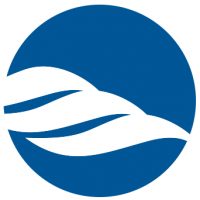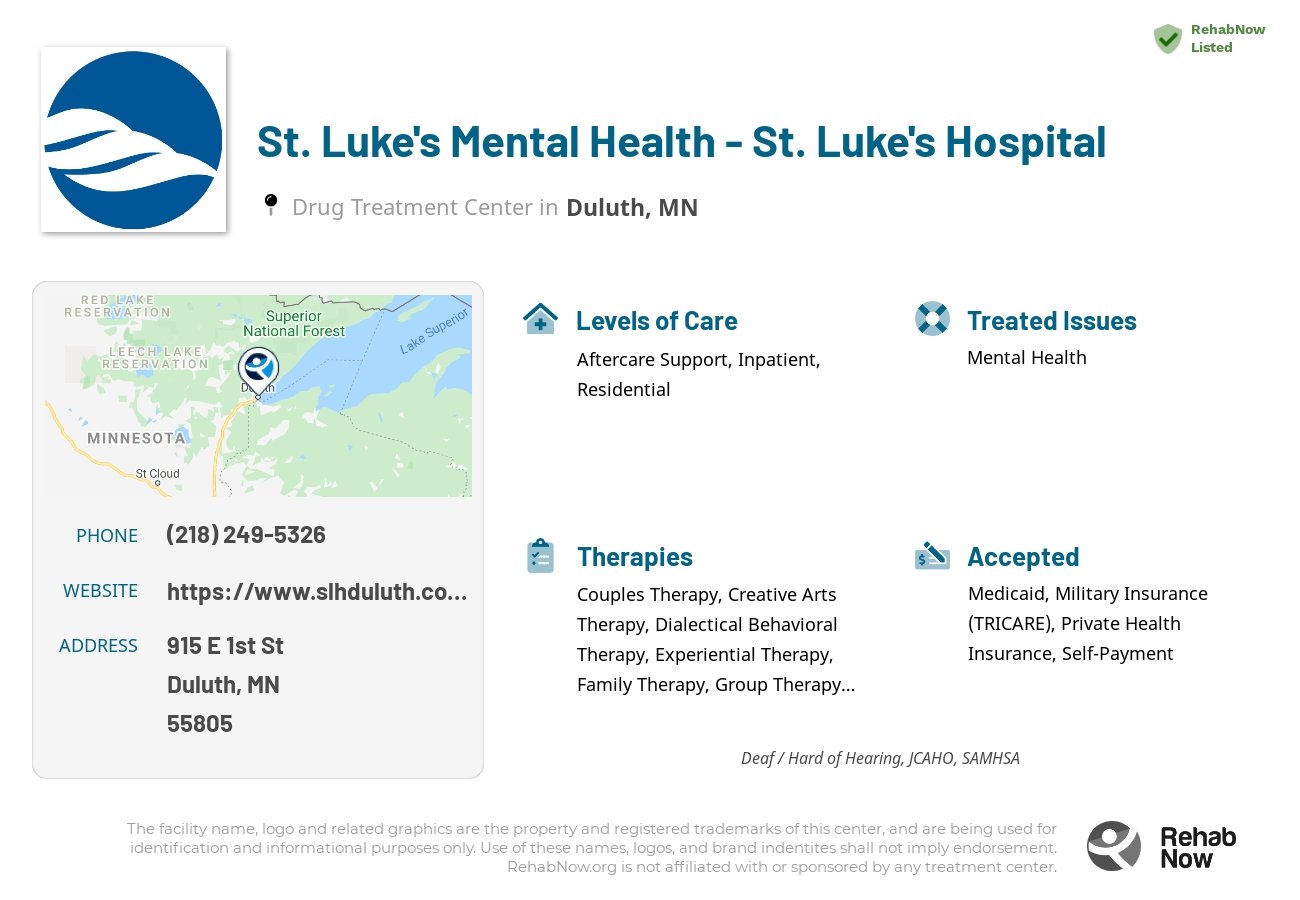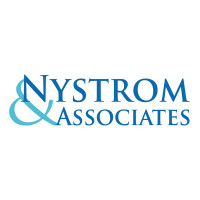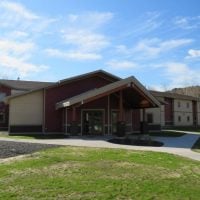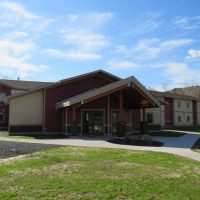St. Luke's Mental Health - St. Luke's Hospital
Drug Rehab Center in Duluth, Minnesota
St. Luke's Mental Health - St. Luke's Hospital in Duluth, Minnesota is an addiction treatment facility that offers a wide range of services, including inpatient, residential, and outpatient levels of care, as well as aftercare support, to individuals suffering from mental health and drug addiction.
About This Minnesota Facility
St. Luke's Mental Health - St. Luke's Hospital, nestled in Duluth, Minnesota, stands out for its comprehensive inpatient treatment program tailored for individuals grappling with mental health issues. This facility is distinguished by its patient-first approach, high-quality medical staff, and a wide array of services including clinical hypnosis and biofeedback, making it a unique choice for those seeking sobriety from drugs or alcohol.
- Patient-Centered Focus: At St. Luke's, the emphasis on putting the patient above all else ensures personalized care.
- Wide Range of Services: From clinical hypnosis to outpatient and emergency services, St. Luke's offers diverse treatments.
- Comprehensive Treatment for Mental Health and Addiction: Specialized programs address both mental health issues and substance abuse, providing a holistic approach to recovery.
Accredited by JCAHO, SAMHSA, and holding a state license, St. Luke's Mental Health - St. Luke's Hospital accepts private health insurance, ensuring accessibility for many. The facility's commitment to medical leadership and state-of-the-art care underlines its reputation for excellence in addiction and mental health treatment.
St. Luke's addresses a variety of issues including depression, anxiety, and major psychiatric illnesses, employing methods like cognitive behavioral therapy, medication management, and more. With inpatient, residential, and outpatient care levels, the facility is equipped to offer tailored treatment plans for each individual's journey to recovery.
Genders
Ages
Modality
Additional
Accreditations
State License
SAMHSA

JCAHO
Conditions and Issues Treated
Levels of Care Offered at St. Luke's Mental Health - St. Luke's Hospital
This center offers a variety of custom treatment tailored to individual recovery. Currently available are Aftercare Support, Inpatient, Residential, with additional therapies available as listed below.
Inpatient treatment centers offer a safe, secure, and often medically supervised environment for drug or alcohol-addicted individuals. Many of these facilities are equipped to provide detoxification, treatment for co-occurring mental health disorders, and aftercare programs. The patient typically spends 28 to 30 days at the facility and will receive extensive drug counseling.
Residential treatment programs are those that offer housing and meals in addition to substance abuse treatment. Rehab facilities that offer residential treatment allow patients to focus solely on recovery, in an environment totally separate from their lives. Some rehab centers specialize in short-term residential treatment (a few days to a week or two), while others solely provide treatment on a long-term basis (several weeks to months). Some offer both, and tailor treatment to the patient’s individual requirements.
Aftercare support is vital to the success of someone in drug or alcohol treatment. It involves assisting with entering a sober living home, getting career counseling or educational assistance and even getting the individual lined up with programs like AA and NA. This support helps recovering addicts readjust to normal day-to-day activities and maintain sobriety.
When a person is in drug or alcohol treatment, they have to increase their focus on themselves. They need to learn how to recognize the triggers that cause them to relapse and learn the habits that would benefit them if they were to be sober. This is all part of the growth in recovery, and aftercare is essential to that process.
Therapies & Programs
At St. Luke's Mental Health - St. Luke's Hospital , to learn from past mistakes and improve one’s situation, the recovering person meets individually with a therapist. The counselor or therapist will address addiction causes, triggers, mental issues, dual diagnosis, and aftercare plans during this time. This is a very intense and challenging process. Some clients find it easier to open up to someone other than family or friends who understand their struggles with addiction.
Couples therapy sessions are typically used to help couples in recovery from drug addiction work through their issues. These types of sessions can be beneficial for many reasons, including the fact that they add a layer of accountability when both partners in a couple are recovering from addiction.
Therapy can also provide addicts with another effective way to cope with stress and avoid relapse during difficult situations. This type of therapy can help improve communication with their partners, which can strengthen the relationship and prevent future problems that might lead to relapse.
Family therapy is a crucial part of drug treatment and getting sober. It is one of the most effective ways to help addicts stay on the path to long-term sobriety. An addict’s family can play a vital part in helping them to avoid relapse. They can spot the warning signs and help them get back on track.
In group therapy, recovering addicts meet with a therapist and other people in recovery. Some groups are closed, meaning only people who share the same addiction or problem can attend. Others are open to anyone who wants to stop using drugs or drinking alcohol. Group therapy sessions typically focus on one topic each week or month so that recovering addicts can discuss issues they face daily.
Dialectical Behavior Therapy (DBT) is a type of therapy created in the late 1980s and early 1990s. It was designed to help people with high rates of suicidal behavior.
The goal of DBT is to teach mindfulness, distress tolerance, emotion regulation, and interpersonal effectiveness to help people learn how to live a life that is no longer controlled by overwhelming emotions and urges.
DBT is beneficial in treating drug addiction because it helps patients understand and cope with their cravings for drugs or alcohol rather than turning to those substances as a way of coping.
Cognitive Behavioral Therapy (CBT) is based on the idea that how we feel, think and act all interact together. It helps people explore their thoughts for problems (or false beliefs) that influence their mood and actions. CBT is very goal-oriented, which means that the therapist and patient work together on a specific problem. In addition to helping a client focus on thoughts that can be changed, CBT also allows them to take an active role in their treatment. Our thoughts determine our feelings and behaviors; our feelings affect our thoughts, and our behaviors change our thoughts and feelings.
Patient Experience
Creative Arts
Creative arts therapy is an expressive process that helps people in recovery explore feelings and emotions. While the goal isn’t always to create a final product, it’s therapeutic for many patients. They can express themselves by journaling or other forms of creative expression. Activities include sketching, painting, sculpting, etcetera. All help them handle stress and anxiety better than before their addiction (and even when they were). The activity improves communication skills and the ability to process traumatic events from one’s past, often triggered during periods of withdrawal/relapse. This benefit makes this form of treatment popular among addicts who don’t want prescription drugs but need something more substantial than talk sessions with counselors.
Experiential Therapy at St. Luke's Mental Health - St. Luke's Hospital
Experiential Therapy is a different way of thinking about addiction treatment. It uses physical activities to help work through troubling emotions, memories, and trauma that are sources of psychological issues like addiction.
Experiential Therapy can be an effective option for those who have struggled with past traumas or challenges associated with life decisions such as drug use. The non-traditional approach helps people deal more effectively with these struggles. It also allows them to gain new perspectives on their behavior patterns by recreating experiences in healthy ways rather than continuing old habits that may no longer serve them.
Payment Options Accepted
For specific insurance or payment methods please contact us.
Is your insurance accepted?
Ask an expert, call (888) 674-0062
St. Luke’s Mental Health Associated Centers
Discover treatment facilities under the same provider.
- St. Luke's Mental Health - Lake View Medical Clinic in Two Harbors, MN
- St. Luke's Mental Health - Laurentian Medical Clinic in Virginia, MN
- St. Luke's Mental Health - Hillside Center in Duluth, MN
- St. Luke's Mental Health - Hibbing Family Medical Clinic in Hibbing, MN
- St. Luke's Mental Health - Denfeld Medical Clinic in Duluth, MN
Learn More About St. Luke’s Mental Health Centers
Additional Details
Specifics, location, and helpful extra information.
Duluth, Minnesota 55805 Phone Number(218) 249-5326 Meta DetailsUpdated April 15, 2024
Staff Verified
Patient Reviews
There are no reviews yet. Be the first one to write one.
Duluth, Minnesota Addiction Information
Minnesota is fighting an opioid epidemic that is leaving hundreds of its residents dead each year. Both prescription opioids and illicit opioids are widely abused in the Land of 10,000 Lakes. Heroin continues to be one of the most commonly abused drugs in the state, if not the most common illicit drug. Over 10% of all treatment admissions in Minnesota list heroin as their drug of choice.
Duluth has a high rate of drug overdoses, with a total of 46 in 2016. In 2016, there were 708 admissions to drug and alcohol treatment centers in Duluth. The most common drugs of abuse are marijuana (39%), methamphetamine (27%), cocaine (19%), and heroin (5%). Drug treatment in Duluth can vary depending on the person's needs and preferences. Some rehab centers also offer holistic treatments, such as yoga and meditation.
Treatment in Nearby Cities
- Little Falls, MN (122.6 mi.)
- Ogema, MN (182.4 mi.)
- Rush City, MN (87.6 mi.)
- Sawyer, MN (27.3 mi.)
- Albert Lea, MN (226.6 mi.)
Centers near St. Luke's Mental Health - St. Luke's Hospital
The facility name, logo and brand are the property and registered trademarks of St. Luke's Mental Health - St. Luke's Hospital, and are being used for identification and informational purposes only. Use of these names, logos and brands shall not imply endorsement. RehabNow.org is not affiliated with or sponsored by St. Luke's Mental Health - St. Luke's Hospital.
